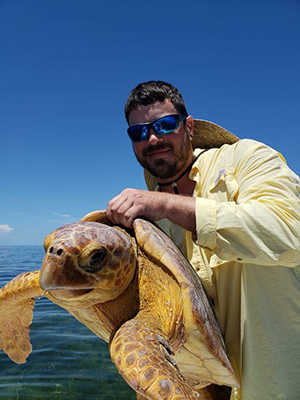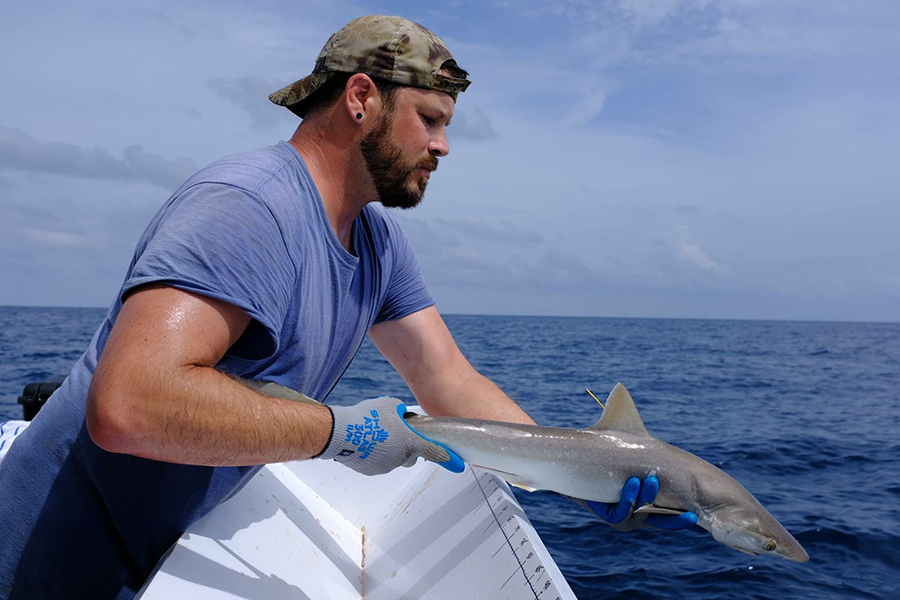Student Spotlight: Barry Walton

examines a loggerhead turtle in the Gulf of Mexico.
(All handling and work related to the endangered
species is permitted by NMFS 19496 and
FWC 18-243.)
Barry Walton is pursuing a master’s degree in oceanography within the Department of Earth, Ocean and Atmospheric Science, part of Florida State University’s College of Arts and Sciences. He is the recipient of the Guy Harvey Scholarship Award.
Where are you from, and what is your anticipated graduation date?
I am originally from Memphis, Tennessee, and I am just about to enter my second year of my master’s with a planned graduation in the spring of 2020.
How did you learn about the Guy Harvey Scholarship Award?
I became familiar with Guy Harvey and his work while stationed in Hawaii with the Marine Corps. After joining the FSU Coastal and Marine Laboratory, I read through the many copies of the Guy Harvey magazine that are all over the lab. When I saw the scholarship advertised, along with several others from the Florida Sea Grant program, I asked my advisers and other researchers/grad students at the lab about it, and they encouraged me to apply. I was lucky enough to be selected.
What on-campus resources/departments or offices helped you prepare both on an academic level and in the application process?
In addition to excellent guidance from my advisers, Dr. Chip Cotton and Dr. Mariana Fuentes, I used the resources at the Career Center to help me prepare a CV to submit with my grant application. I have a great deal of prior experience and skills gained from military service before I started my academic career, and the Career Center helped me include as much of that as possible in a professional and succinct manner.
What aspect of the scholarship do you find most exciting?
The fact that every day is different. For my research, I have to be out on the water as much as possible to collect my specimens, and every day we encounter something new and exciting, whether it be large sharks such as tigers, bulls or hammerheads, or stingrays and other fish species, including my beloved marine catfish.
I also get to do plenty of scuba diving in a scientific capacity and see animals such as sea turtles, dolphins and even the occasional manatee underwater, so it's just incredibly exciting that on any given day I can have a unique experience with wildlife that most people never get to have. My work is breaking new ground to learn more about these creatures so that we can be better empowered to make more informed management decisions in hopes of preserving marine life for future generations to enjoy.
After this opportunity, what are your plans?
After completing my master’s, I plan on pursuing a Ph.D. and remaining within the field of marine biology/biological oceanography. Ideally, I would love to stay here at FSU and continue to work out of the Coastal and Marine Laboratory; however, for my Ph.D., I am most interested in studying elasmobranchs (sharks and rays). I would like to study their stress physiology and understand how it is being affected by anthropogenic factors. Changes in stress levels can significantly influence the reproduction and growth of these animals so, by understanding that interaction, we can hopefully mitigate future impact, which is crucial to protecting these species.
What brought you to FSU?
While finishing my bachelor’s at Mississippi College in Clinton, Mississippi, my adviser and fellow wildlife photographer, Dr. Hensley, suggested that I look at a few schools for potential spots for graduate school — and FSU was one of them.
I had an offer to work in Alaska on polar bears (and on a fully funded project), but after driving down from Mississippi to interview here with Dr. Cotton, I knew FSU was where I belonged. As part of my interview process, I spent three days in the field conducting shark surveys and after pulling in our first large shark, a 9-foot lemon shark, I was “hooked.” I also spent a lot of time visiting places on campus and talking with other graduate students, and everyone was so helpful and kind. It affirmed my decision.
What inspired you to choose your major, or more specific research?
As a child, I was immediately fascinated by the ocean and had every “Shark Week” on VHS and would replay them over and over again. After high school, I joined the Marine Corps and worked as a dog handler. Even though I had the desire to go straight into college and chase my dream of becoming a marine biologist, my desire to serve made me put that dream on hold.
As a Marine, I trained and employed explosive-detection dogs and spent 18 months in Iraq searching for IEDs, weapons caches and supporting as many combat operations as possible. While serving, I was lucky enough to be stationed in Hawaii, where I fell in love with scuba diving. I remember a very close encounter with an endangered Hawaiian monk seal, and it was just awe-inspiring. I realized I just had an experience that not many will ever have, especially since there were only around 1,200 monk seals left in the wild at that time. I told myself then and there that when my time as a Marine was over, I would chase more experiences like that with a career in marine biology.
Eventually, I retired from the Marines after 10 years due to combat injuries, so I got my chance. I chose the catfish species for my research because they are unstudied; I am the first person doing any work on them. They are unstudied because they are economically unimportant, as there are no commercial fisheries for these species in the U.S. However, they are ubiquitous, so they are ecologically important and we must understand them. Also, my research will provide me with plenty of transferable skills that I can take with me and apply to future work toward a Ph.D.
Are there any faculty or staff that have helped or inspired you?
Absolutely. I am inspired by people in my field on a daily basis. But there are two shark biologists at the FSU lab who keep me inspired and make me want work as hard as possible to finish a Ph.D. so that I can one day be in their place.
Dr. Cotton and Dr. Dean Grubbs both work incredibly hard and do amazing research. What truly inspires me about both of them is seeing their passion for their work. When a shark comes up, or if we get a shark on deck and get it tagged and sampled and safely back into the water, their faces light up and you can just see true joy. They are excited that the shark we just released will teach us more so that we can better understand the species and how to protect them. The fact that they both have been doing this for 20-plus years and they still have that childlike sense of wonderment and incredible enthusiasm for their work is inspiring to me, and I hope to still be grinning from ear to ear every time I get to work as they do.
What do you like to do when you’re not doing schoolwork or research?
When I am not working, I love to dabble in wildlife photography. I mainly photograph birds and reptiles but would someday like to invest in underwater equipment and begin trying to film/photograph sea life using scuba.
I also still train dogs for private clients and volunteer my time to train service animals for people who suffer from Post-Traumatic Stress Disorder. As of now, I have donated 12 fully trained service dogs to people with PTSD and hope to continue this work in the future.
Although you might miss FSU, what are you looking forward to in your post-grad life?
I will certainly miss FSU, but what I will miss most about graduate-student life is the same thing I miss most about life as a Marine — the camaraderie.
However, I am looking forward to the challenge of post-grad life. I am very excited to find a place where I can do my research and develop my own techniques and research what I feel is important. I also am looking forward to teaching someday.
I would really love to be the person who inspires, like my professors inspire me, so I can prepare the next generation to keep working to learn more about marine life and protect it for the future.

